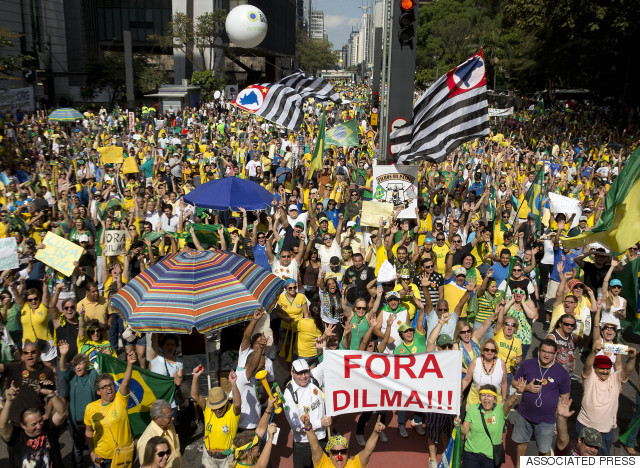
I know. It is quite odd for one of the leaders of the movement working towards the impeachment of President Dilma Rousseff to write an article declaring that Brazilians don't care about the impeachment. But that's the truth. And it isn't necessarily a negative thing.
Even after the "mensalão" scandal, a large portion of the population still trusted the Workers' Party (PT).
It is undeniable that during Lula's government, there was an improvement in the country's social and economic conditions. Whether that happened because of him or in spite of him, is a different matter. The point is that Brazilians still didn't find enough reasons to discredit Lula or the PT.
"The party that fiercely promoted anti-corruption discourse was caught carrying out one of the world's largest corruption schemes."
If the country experienced such a great improvement during his government, how could Lula be the mastermind behind a corruption scheme that perverted the concept of democracy? He clearly wasn't aware of the details. At least, that's how it seemed.
With the "petrolão" scandal, the PT was no longer regarded as an honest entity by its supporters.
The party that fiercely promoted anti-corruption discourse was caught carrying out one of the world's largest corruption schemes.
Nevertheless, the party still had significant popular support. Since the people were used to reading about corrupt politicians from across the political spectrum, it was easy to contain the scandal. The PT's government stole? So what? Previous governments also stole. The difference is that now, the cleaning lady's son is able to travel by plane.
The party's top members were judged and condemned? So what? Sons and daughters of working class parents can now attend universities! The government abandoned the avant-garde anti-corruption rhetoric and adopted a well-known conservative politician's old motto: "He steals, but he gets things done."
After Dilma Rousseff's reelection, the scenario changed completely.
The corruption scandals continued to emerge, but the economic and social wonders vanished. The period of prosperity had finally come to a close. And the population felt it more than ever before.
"Brazilians have already been let down, disappointed, and outraged. And now, they have different concerns."
Never before in the country's history were the figures for the dollar exchange rate, the inflation rate, and the president's popularity so close together.
The people finally reacted. In a single year, they attended the three largest protests in the country's history.

A protest demanding the impeachment of Brazil's President Dilma Rousseff in Sao Paulo, Brazil, August 16, 2015.
Dilma Rousseff became the president with the lowest approval rating in Brazil's history.
Ironically, these historical events unfolded thanks to a party led by a man who claimed that he had achieved unprecedented achievements in the country's history.
I mentioned all of the above to explain why Brazilians are fed up. They are so fed up with discussing the fall of a government they reject.
Brazilians have already been let down, disappointed, and outraged. And now, they have different concerns. And I don't mean carnival or soccer. I don't believe that Brazilians are shallow, as some analysts seem to think. I'm talking about the future; about ideas and reforms.
Young people must debate the billion-dollar social security deficit. They must seek alternatives for their future.
"Nobody has the time or the patience to discuss the fate of the PT's government."
What if we based the retirement plans of our citizens on savings and investments, instead of basing them on endless deficit?
Parents must debate education. Why are they forced to pay crippling taxes while watching their children study in schools with poor infrastructure and absent teachers?
What if the state stopped interfering with education? What if everyone could send their children to quality private schools, using vouchers provided by the government?
Businessmen and employees must debate their own freedom...Why must the government make the former's products more expensive and grab part of the latter's salary? Why does the money they work hard to gain go straight to contractors and banks allied with the government?
Nobody has the time or the patience to discuss the fate of the PT's government. Only members of the government have time for that. And they spend 24 hours a day worrying about losing their jobs, completely forgetting that their function is to govern and not to desperately fight to hold onto power.
Brazil has already overcome its unpleasant experience with the Workers' Party government. The government must now realize that people have already overcome it.
This post first appeared on HuffPost Brazil. It has been translated into English and edited for clarity.
